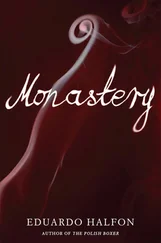Eduardo Halfon - The Polish Boxer
Здесь есть возможность читать онлайн «Eduardo Halfon - The Polish Boxer» весь текст электронной книги совершенно бесплатно (целиком полную версию без сокращений). В некоторых случаях можно слушать аудио, скачать через торрент в формате fb2 и присутствует краткое содержание. Год выпуска: 2012, Издательство: Bellevue Literary Press, Жанр: Современная проза, на английском языке. Описание произведения, (предисловие) а так же отзывы посетителей доступны на портале библиотеки ЛибКат.
- Название:The Polish Boxer
- Автор:
- Издательство:Bellevue Literary Press
- Жанр:
- Год:2012
- ISBN:нет данных
- Рейтинг книги:4 / 5. Голосов: 1
-
Избранное:Добавить в избранное
- Отзывы:
-
Ваша оценка:
- 80
- 1
- 2
- 3
- 4
- 5
The Polish Boxer: краткое содержание, описание и аннотация
Предлагаем к чтению аннотацию, описание, краткое содержание или предисловие (зависит от того, что написал сам автор книги «The Polish Boxer»). Если вы не нашли необходимую информацию о книге — напишите в комментариях, мы постараемся отыскать её.
marks the debut of a major new Latin American voice in English.
The Polish Boxer — читать онлайн бесплатно полную книгу (весь текст) целиком
Ниже представлен текст книги, разбитый по страницам. Система сохранения места последней прочитанной страницы, позволяет с удобством читать онлайн бесплатно книгу «The Polish Boxer», без необходимости каждый раз заново искать на чём Вы остановились. Поставьте закладку, и сможете в любой момент перейти на страницу, на которой закончили чтение.
Интервал:
Закладка:
Head bowed, Milan had placed his hands on his thighs and again possibly had his eyes closed. Observing him in this state of deep concentration took me back to that part in his anecdote about the rainy day with the old Jew. He’s deciding what to play, I whispered to Lía, who was still trying to decipher the program. Saint-Saëns, it says here. It’ll be anything but Saint-Saëns, I assured her. How do you know? Bazar Lerman, I said, and just then, as if invoked by the hushed prayer of a necromancer, a gray or possibly gray-white pigeon flew into the ruins and made its way to the vault’s highest point, directly above the stage. A number of chicks began to screech while the pigeon beat her wings and tried to steady herself. Birdies! the boy shouted, already up on his feet again, pointing at his latest discovery. The audience shifted, embarrassed, and then, irrefutably, up surged Rachmaninoff. It could have been the Piano Sonata no. 2, but equally it could have been any other concerto or prelude for piano. Fast. Intense. Perfectly ordered. Like the unstoppable zephyr of a hurricane or of Lía’s raging sea, I thought (or maybe felt). Then, seeing the boy’s euphoria at the racket being made by the hungry chicks, I thought the music was exactly like a churning swarm of doves or parakeets or blue Amazonian cockatoos, an overcast sky full of blue Amazonian cockatoos flying gently along, screeching with a precise logic that from afar seems so chaotic, so bold, so movingly fortuitous. Milan’s hands were a smudge of skin in motion. Out of focus. His hair buffeting around. The boy carried on pointing toward the roof as he hopped up and down on his metal chair: Birdies, birdies! The chicks had just then gone quiet.
Applause. Milan with his head bowed once more and another long silence. What next? murmured Lía. I didn’t say anything. The program was now lying on the ground.
He started playing a forceful, energetic piece that had moments of fading to almost nothing and then, intensely, dramatically, shot upward again. An unrecognizable rise and fall that went on and on for thirty or forty minutes perhaps. But in the midst of this din of opposing emotions, of periods of peace and periods of anxiety that seemed to awaken the drowsy, ingenuous audience, I thought I heard — briefly, from a long way down, and as if tangled up in lots of other chords — a number of Thelonious Monk’s syncopated melodies. Strange, I know. I thought I heard “Straight, No Chaser” and then “Trinkle, Tinkle” and then “Blue Monk” and later maybe even a small segment of “Epistrophy.” Very far off. You might almost say subliminally, but not even that. Segments too fleeting to pin down, I suppose, but clear enough (within that labyrinth) for a devotee of Monk’s works and particularly of his percussive style, of the way in which he used to hammer and punish the keys. Although who knows, really. Sometimes, when confusion reigns, you can only hear the music that’s already inside you.
Milan vanished without a word. The people were on their feet, applauding and smiling serenely and begging for more. Clearly, he wouldn’t be coming back on.
We found him in an ad hoc dressing room: on his own, smoking, a light blue towel around his neck. Lía kissed him on both cheeks. I embraced him. I don’t know why, but he had the air of a wounded soldier, not fatally wounded, but vitally wounded, happily wounded, buoyantly wounded, contentedly wounded, wounded in such a way that finally he’d be able to abandon the war and go back to the peace and quiet of his home. Right, he said, stubbing out his cigarette, should we go get some food?
Lía needed to rest, she said, sleep for a few hours, but she’d join us after lunch for a coffee, she promised, and say goodbye to Milan before he made his way to the airport. He was flying back to New York that night.
We went to La Cueva de los Urquizú—a rustic, basic eatery with plastic tablecloths, plastic trays, and disposable cutlery that was probably never disposed of — so Milan could get a taste of Guatemalan food.
What’s this music? he asked as he was sitting down. I told him it was a ranchera song and Milan frowned, although I had no idea why. It was dog-day hot. I ordered two beers and we began a liturgy of smoking. On one side of us, an entire family was rushing through their meal ravenously, barely even looking at one another. Živeli, said Milan, raising his beer. Salud.
I asked if he always decided what pieces to play at the last minute. Always. But please don’t ask me how I decide. I don’t know. Sometimes they threaten not to pay me, and once, in Rome, they even insulted and booed me, he said rather proudly, but audiences are in general tolerant or maybe they’re a little innocent and they put up with my whims anyhow. You improvise, I said, depending on whether it’s raining or not. Something like that, he said, smiling. I asked about the last piece. Liszt, he said, but a Liszt piece even Liszt experts don’t know. I looked at him, perplexed. I played it to Berman, or Lerman, as they call him round here, and he admitted he’d never heard it before. I found it (or maybe he said discovered or rescued it). It was hidden away, gathering dust in a library in Belgrade.
The waiter came, and Milan, between sips, said you decide. To start, I ordered portions of guacamole, black beans topped with cheese, chorizo, and tortillas.
Actually, he said after a moment of quiet, it’s an arrangement by Liszt for organ and later by Busoni for piano, from an opera by the German, Meyerbeer. But a strong arrangement, dark, beautiful, and one that for some reason no one knows about.
The waiter served us a number of dishes and Milan began picking at everything, freely, not asking questions, not putting out his cigarette, and not mentioning Monk.
And why such an affinity with Liszt, Milan? He looked up at me and remained quiet for a moment, but it was a bustling sort of quiet, weighted, like the portentous silence just before a train arrives. He opened his mouth but then quickly shut it again — thinking better of it, I suppose. We both watched the family of gluttons leaving slowly. Oh I don’t know, he suddenly whispered in a mentholated voice, maybe because Liszt still allows for improvisation. This was what Milan said, though I’m sure there was something else he wanted to tell me. His music is an open structure, that’s one way of putting it, he said, and took an immense bite out of his tortilla, which was piled high with guacamole. I suspect, he said, still chewing, it’s like being able to play and stretch and fly inside a framework made of air. Hearing this, I imagined thousands of little musical notes floating around inside a white cloud, bumping into one another, desperately wanting to escape. Liszt’s works allow for that, he said, much more than other composers. Know what I mean? The musician, he said, cannot be an automaton. There are boundaries laid down somewhere that at the same time aren’t really there or shouldn’t really be there. For instance, boundaries within a piece, or boundaries between interpretative techniques, or even boundaries between genres. Why create boundaries between genres? Why differentiate between one type of music and another? It’s all the same. Music’s music. And he took an endless swig of beer. Should we order something else? he said with the look of a famished, mischievous adventurer, and so I ordered a dish of pepián stew, another of caquic, and two chipilín tamales.
Sure, Milan, I said without really understanding what he was talking about, or perhaps understanding too well. But why are you so keen to push these boundaries, ignore them, make them disappear? Why are you so interested in the music of someone who invites you to move them and make them disappear? It’s revolutionary. It’s seditious. It’s a bit bohemian, I said, in the strictest sense of that overused word. Why not work within those boundaries? Why the stubborn need to avoid them or rebel against them? Milan said nothing, swirling what was left of his beer around in the glass. Forgive the inquisition, I said, not knowing exactly where I was headed, but I’m fascinated by internal rather than external revolutions. I’m obsessed by them. For example, I’m far more interested in the motorcycle journey Che Guevara embarked on when he was twenty-four — where so many of his ideas were formed and where something magical incubated inside him for the first time — than I am by all the revolutions he went on to foment in Latin America and Africa. Up to a certain point, how and why someone is pushed toward a revolution of the spirit, whether it be artistic or social or whatever, strikes me as a far more honest search than all of the spectacle that follows. Because everything after that, Milan, is pure spectacle. Everything. Painting a canvas? Spectacle. Writing a novel? Spectacle. Playing the piano? Spectacle. And the Cuban revolution? Pure spectacle. The waiter came with our food, but I ignored him. Anyway, I said, sighing a hazy conclusion.
Читать дальшеИнтервал:
Закладка:
Похожие книги на «The Polish Boxer»
Представляем Вашему вниманию похожие книги на «The Polish Boxer» списком для выбора. Мы отобрали схожую по названию и смыслу литературу в надежде предоставить читателям больше вариантов отыскать новые, интересные, ещё непрочитанные произведения.
Обсуждение, отзывы о книге «The Polish Boxer» и просто собственные мнения читателей. Оставьте ваши комментарии, напишите, что Вы думаете о произведении, его смысле или главных героях. Укажите что конкретно понравилось, а что нет, и почему Вы так считаете.












